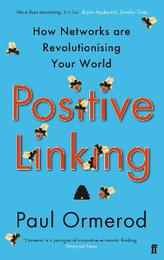
|
Positive Linking: How Networks Can Revolutionise the World
Paperback / softback
Main Details
| Title |
Positive Linking: How Networks Can Revolutionise the World
|
| Authors and Contributors |
By (author) Paul Ormerod
|
| Physical Properties |
| Format:Paperback / softback | | Pages:320 | | Dimensions(mm): Height 198,Width 126 |
|
| Category/Genre | Economic theory and philosophy |
|---|
| ISBN/Barcode |
9780571279210
|
| Classifications | Dewey:330.01 |
|---|
| Audience | | Tertiary Education (US: College) | | Professional & Vocational | |
|---|
| Edition |
Main
|
|
Publishing Details |
| Publisher |
Faber & Faber
|
| Imprint |
Faber & Faber
|
| Publication Date |
6 June 2013 |
| Publication Country |
United Kingdom
|
Description
According to Paul Ormerod, author of the bestselling Butterfly Economics and Why Most Things Fail, the mechanistic viewpoint of conventional economics is drastically limited - because it cannot comprehend the vital nature of networks. As our societies become ever more dynamic and intertwined, network effects on every level are increasingly profound. 'Nudge theory' is popular, but only part of the answer. To grapple successfully with the current financial crisis, businesses and politicians need to grasp the perils and possibilities of Positive Linking. Our social and economic worlds have been revolutionised by a massive increase in our awareness of the choices, decisions, behaviours and opinions of other people. For the first time in human history, more than half of us live in cities, and this combined with the Internet has transformed communications. Network effects - the fact that a person can and often does decide to change his or her behaviour simply on the basis of copying what others do - pervade the modern world. As Ormerod shows, network effects make conventional approaches to policy, whether in the public or corporate sectors, much more likely to fail. But they open up the possibility of truly 'Positive Linking' - of more subtle, effective and successful policies, ones which harness our knowledge of network effects and how they work in practice.
Author Biography
Paul Ormerod is the author of The Death of Economics, Butterfly Economics and Why Most Things Fail. He studied economics at Cambridge and his career has spanned the academic and practical business worlds, including working at the Economist and as a director of the Henley Centre for Forecasting. He is a Fellow of the British Academy of Social Science and has been awarded a DSc honoris causa for his contribution to economics by the University of Durham.
|